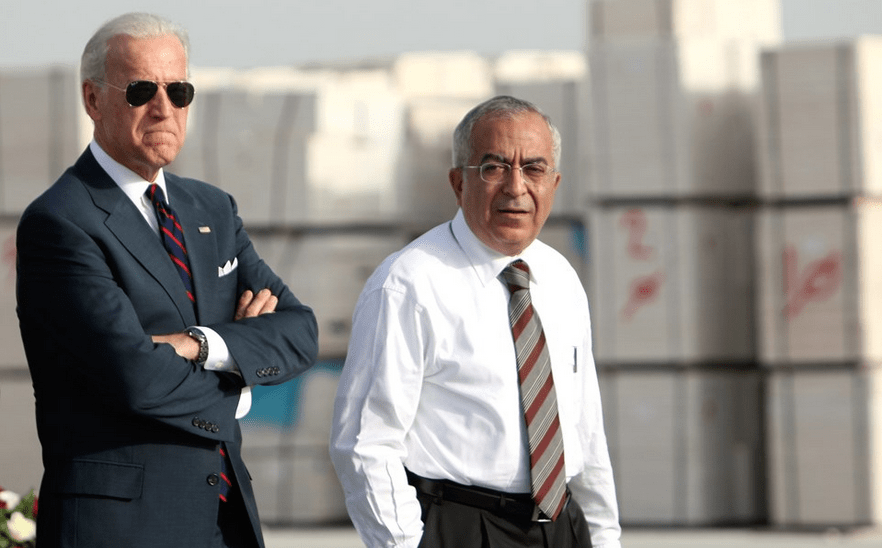Netanyahu’s No-State Solution and the Provocations of Peace
As a recent experiment in Palestinian statehood proved, the history of the Israeli-Palestinian dynamic is both tragedy and farce.

Gaza, May 10, 2021/Reuters
Lisa Van Dusen
May 18, 2021
In August of 2009, Palestinian Prime Minister Salam Fayyad began to implement a radical vision for Palestine. It was based on the principle that if Palestinians took ownership of their future, stopped waiting for the next convergence of Knesset kismet and peace-process reanimation, and began behaving as if Palestine were already a de facto state, then de jure statehood would be inevitable.
It required a leap of faith on the part of people trapped in a culture in which violence, resistance, hatred and imprisonment are normalized — to see both their occupiers and themselves differently. It demanded a shift in perspective away from victimhood to self-empowerment based on a renunciation of violence and an embrace of civil disobedience according to the philosophies of Gandhi and King, including a recognition that King’s “inescapable network of mutuality, tied in a single garment of destiny” applied to Israelis as well as to themselves. It was based on the idea that if Palestinians stopped harming their neighbours while asking for a state and started peacefully fulfilling their own statehood, the worst thing that could happen would be a revelation of truth as to where everyone really stood.
Fayyad, a University of Texas-educated economist now teaching at Princeton, essentially shook things up by not shaking things up. As the New York Times reported in April, 2010: “Something is stirring in the West Bank. With both diplomacy and armed struggle out of favor for having failed to end the Israeli occupation, the Fatah-dominated Palestinian Authority, joined by the business community, is trying to forge a third way: to rouse popular passions while avoiding violence.”
In the two years that Fayyad’s security forces and ministries had been functioning, the Times reported, “daily life inside West Bank cities and their surroundings has taken on much greater safety and normality. The police and the courts are functioning again after the intifada of 2000 that led to many deaths on both sides. Traffic tickets are now routinely handed out. Personal checks, long shunned, are increasingly in use.”
It worked. The de facto state and the civil disobedience did function quite beautifully for a while, notwithstanding the occasional veer into less placid protest. And Fayyadism, ultimately, revealed the core agendas on both sides — who had an overwhelming interest in maintaining an inhuman status quo and who really cared about bringing both peace and peace of mind to Israelis and Palestinians.
By 2013, the New York Times headline on Roger Cohen’s column about Fayyadism was The Success that Failed. Cohen essentially described Fayyad as a sane man in an inherently insane context. “To Israel he was a conundrum: a potential partner but also the politician from hell,” Cohen wrote. “For if Fayyadism was the new reasonable face of Palestine, why could putative Palestine not come into being?”
When you consider the Marxist — both Karl and Groucho — farce of that conundrum, you begin to understand the depth of tragedy in this conflict and its trajectory since Fayyad left office four months after Cohen interviewed him in Ramallah.
“Everything evolved negatively,” Fayyad told Cohen. “In deeds, Israel never got behind me; in fact, it was quite hostile. The occupation regime is more entrenched, with no sign it is beginning to relinquish its grip on our life. There are more settlements, more settler violence, more intrusiveness into all aspects of Palestinian life.”
Despite paying lip service in 2009 to the concept of a two-state solution, Cohen wrote, “Prime Minister Benjamin Netanyahu has seemed intent on sending this message to Fayyad: Good behavior brings further punishment.”

Vice President Joe Biden with Palestinian Prime Minister Salam Fayyad touring the Nassar stone factory in Bethlehem, West Bank, in 2010/Reuters
Only in a dynamic as dysfunctionally co-dependent as this one could peace, order and good government be seen as a provocation worthy of a crackdown. Only in this conflict could anyone accurately label an approach based on the assiduous adoption of normalcy “radical”. But as an exercise in constructive exposition, the failure of Fayyadism revealed this: If Israel couldn’t abide even the rehearsal of a Palestinian state, that left the only alternative anyone considered feasible at the time — usually uttered as a threat by Palestinian negotiators like the late Saeb Erekat on really bad days — the one-state solution. If Palestinians could not have a state, they would become citizens of Israel with all the same rights as Arab Israelis, including voting rights. But since that would involve the assimilation of nearly 5 million Palestinians with an asymmetrically high birth rate into a Jewish state of 9 million, including 2 million Arab Israelis — hence the term “demographic time bomb” — it has been, for Netanyahu and many more moderate voices, understandably a non-starter.
In the years since Fayyad returned to academia, Benjamin Netanyahu has, through a cunning array of stunts of both the security and electoral variety, identified his preferred option, and it is none of the above. As has become obvious again in the past six weeks, Netanyahu’s preferred solution is the chronic, infinite absence of real peace entrenched in the status quo, or worse. At a time when, as has been widely reported, human rights and democracy are being undermined globally by China, by an array of covert actors and by assorted hypercorrupt interests who thrive on fomenting chaos, Netanyahu’s bleak vision for Israeli-Palestinian coexistence has finally found its level.
Technology now enables the broader control of Palestinians through surveillance-state capabilities that make the existing, intricate system of West Bank checkpoints look like an ornamental game of Mother-May-I. And as long as Hamas is in place in Gaza to violently rationalize Israel’s security infrastructure, social license — to the extent that increasingly besieged and degraded Israeli democracy requires it — shouldn’t be a problem, the reasoning seems to go.
Absent in this reasoning is any apparent consideration for the lives of not just Palestinians who continue to live without legal status, rights and freedoms but of Israelis who can’t be walled off, distracted or misinformed about that injustice forever. It represents the decoupling of morality from governance — another terribly ugly global trend these days, and what happens when democracy is weakened.
Among the other ways in which Netanyahu’s tenure is doing for Israel what Donald Trump has done for the Republican Party; he has undermined the trust that long existed between Israel and its supporters worldwide based on the tacit understanding that Israel would not give its opportunistic enemies — anti-Semitic, strategic or both — undue ammunition. Every prime minister since David Ben-Gurion has understood that, and it calibrated the Israeli side of this dynamic for decades. The weakening of Israeli democracy that has seemingly given Netanyahu free rein to use election after election after election after election to keep himself in office and out of jail and his people in perpetual plebiscite also, apparently, manifests in a disdain for public opinion elsewhere.
As Salam Fayyad learned the preposterous way, every action in this relationship provokes a reaction. And every player knows exactly what sort of reaction every action is likely to provoke. When Benjamin Netanyahu made unmistakable shifts in the security situation of Jerusalem and the rights of Palestinians living there a whole new thing recently, he knew exactly what to expect in the way of response. And when he doubled down on that narrative by sending the IDF into the Al Aqsa Mosque during Friday prayers with stun grenades, rubber bullets and tear gas, he had absolutely no reason to expect, when checking his Israeli/Palestinian Action/Reaction app, to see anything other than Hamas rockets. Just as Hamas knew full well those rockets would provoke Israeli air strikes. The only unknown then was Netanyahu’s political future, which now seems suddenly less uncertain. As the longest-serving leader in the history of Israel, the one thing Netanyahu cannot claim to be in the face of any action, reaction, provocation or response in this conflict is surprised.
For his part, Fayyad told Cohen back in 2013 he had no regrets. “People will go back to this story,” he mused. “It was about a new way of thinking. And ideas have lasting power.”
Meanwhile, the latest endgame for the man who saw peaceful Palestinian progress as incitement will likely be more of the same.
Lisa Van Dusen is associate editor of Policy Magazine. She was Washington columnist for the Ottawa Citizen and Sun Media, international writer for Peter Jennings at ABC News, and an editor at AP National in New York and UPI in Washington. She was also communications director for the McGill Middle East Program in Civil Society and Peace Building (now ICAN).
